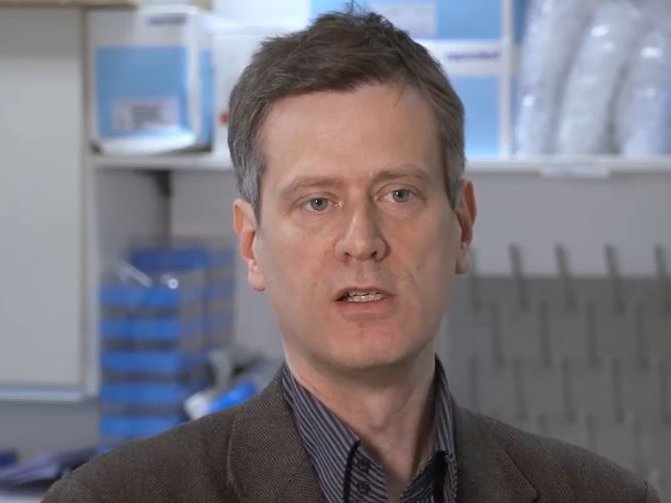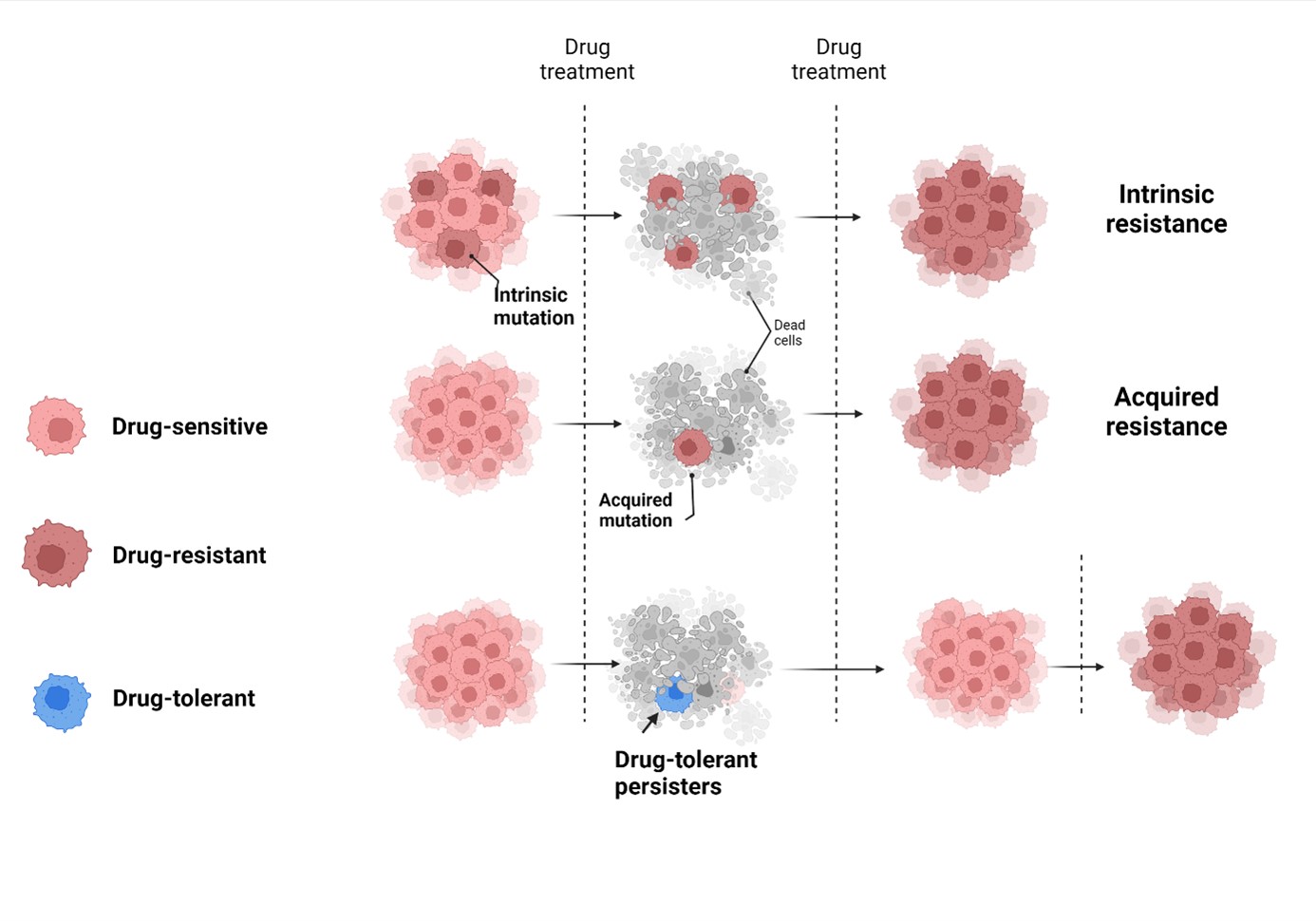Univ.-Prof. Gergely Szakacs, PhD
Forschungsschwerpunkt
Therapieresistenz bei Krebs
Die Aufklärung der molekularen Grundlagen der Therapieresistenz bei Krebs ist ein unerfüllter klinischer Bedarf.
Unser Ziel ist es, die Entwicklung der Krebstherapieresistenz zu charakterisieren. Basierend auf vorläufigen Ergebnissen stellen wir die Hypothese auf, dass die Therapieresistenz mit der seltenen Population von DTP-Zellen (drug tolerant persister) zusammenhängt, die die Behandlung durch die Stabilisierung vorübergehender arzneimittelinduzierter Phänotypen überleben, bis Mechanismen auftreten, die eine stabile Arzneimittelresistenz gewährleisten. Unser Ziel ist es, Tumore in verschiedenen Phasen der Therapie zu charakterisieren, um Schwachstellen diesen adaptiven Prozesses zu identifizieren.
Ein wirksames Targeting von DTPs wird zu einem Paradigmenwechsel führen, der den Fokus von der Bekämpfung von Arzneimittelresistenzmechanismen auf die Verhinderung oder Verzögerung von Therapieresistenzen verlagert, was zu verbesserten Behandlungen von Patient:innen führt.
Im Jahr 2020 haben wir ein Forschungskonsortium innerhalb der Universität gegründet und uns erfolgreich um eine Förderung aus dem FWF Doc-Fonds beworben, um ein exzellenzbasiertes Graduiertenausbildungsprogramm aufzubauen.
Ausgewählte Publikationen
Unshielding Multidrug Resistant Cancer through Selective Iron Depletion of P-Glycoprotein-Expressing Cells
Cserepes M, Türk D, Tóth S, Pape VFS, Gaál A, Gera M, Szabó JE, Kucsma N, Várady G, Vér-tessy BG, Streli C, Szabó PT, Tovari J, Szoboszlai N, Szakács G.
Cancer Res. 2020 Feb 15;80(4):663-674. doi: 10.1158/0008-5472.CAN-19-1407.
Celecoxib Prevents Doxorubicin-Induced Multidrug Resistance in Canine and Mouse Lymphoma Cell Lines
Karai E, Szebényi K, Windt T, Fehér S, Szendi E, Dékay V, Vajdovich P, Szakács G, Füredi A.
Cancers (Basel). 2020 Apr 29;12(5). doi: 10.3390/cancers12051117.
Establishment and Characterization of a Brca1-/-, p53-/- Mouse Mammary Tumor Cell Line
Hámori L, Kudlik G, Szebényi K, Kucsma N, Szeder B, Póti Á, Uher F, Várady G, Szüts D, Tóvári J, Füredi A, Szakács G.
Int J Mol Sci. 2020 Feb 11;21(4). doi: 10.3390/ijms21041185.
In vivo characterization of [18F]AVT-011 as a radio-tracer for PET imaging of multidrug resistance
Kannan P, Füredi A, Dizdarevic S, Wanek T, Mairinger S, Collins J, Falls T, van Dam RM, Ma-heshwari D, Lee JT, Szakács G, Langer O.
Eur J Nucl Med Mol Imaging. 2019 Nov 15;. doi: 10.1007/s00259-019-04589-w.
Pegylated liposomal formulation of doxorubicin overcomes drug resistance in a genetically engineered mouse model of breast cancer
Füredi A, Szebényi K, Tóth S, Cserepes M, Hámori L, Nagy V, Karai E, Vajdovich P, Imre T, Szabó P, Szüts D, Tóvári J, Szakács G.
J Control Release. 2017 Sep 10;261:287-296. doi: 10.1016/j.jconrel.2017.07.010.
Identification and Validation of Compounds Selectively Killing Resistant Cancer: Delineating Cell Line-Specific Effects from P-Glycoprotein-Induced Toxicity
Füredi A, Tóth S, Szebényi K, Pape VF, Türk D, Kucsma N, Cervenak L, Tóvári J, Szakács G.
Mol Cancer Ther. 2017 Jan;16(1):45-56. doi: 10.1158/1535-7163.MCT-16-0333-T.
Targeting the Achilles heel of multidrug-resistant cancer by exploiting the fitness cost of resistance
Szakács G, Hall MD, Gottesman MM, Boumendjel A, Kachadourian R, Day BJ, Baubichon-Cortay H, Di Pietro A.
Chem Rev. 2014 Jun 11;114(11):5753-74. doi: 10.1021/cr4006236.
Identification of compounds selectively killing multidrug-resistant cancer cells
Türk D, Hall MD, Chu BF, Ludwig JA, Fales HM, Gottesman MM, Szakács G.
Cancer Res. 2009 Nov 1;69(21):8293-301. doi: 10.1158/0008-5472.CAN-09-2422.
Targeting multidrug resistance in cancer
Szakács G, Paterson JK, Ludwig JA, Booth-Genthe C, Gottesman MM.
Nat Rev Drug Discov. 2006 Mar;5(3):219-34. doi: 10.1038/nrd1984.
Predicting drug sensitivity and resistance: profiling ABC transporter genes in cancer cells
Szakács G, Annereau JP, Lababidi S, Shankavaram U, Arciello A, Bussey KJ, Reinhold W, Guo Y, Kruh GD, Reimers M, Weinstein JN, Gottesman MM.
Cancer Cell. 2004 Aug;6(2):129-37. doi: 10.1016/j.ccr.2004.06.026.
Alle Publikationen
Vorstellung Gergely Szakacs, Agnes Csiszar

Nach der Aktivierung werden Daten an YouTube übermittelt. Weitere Infos hier: Datenschutzerklärung
Förderungen
- EU/Horizont 2020
- Fonds des Bürgermeisters der Bundeshauptstadt Wien (Agnes Csiszar)
- FWF Der Wissenschaftsfonds: Dok 59
- DOC-Stipendium der Österreichischen Akademie der Wissenschaften (Silvia Steinbauer)

